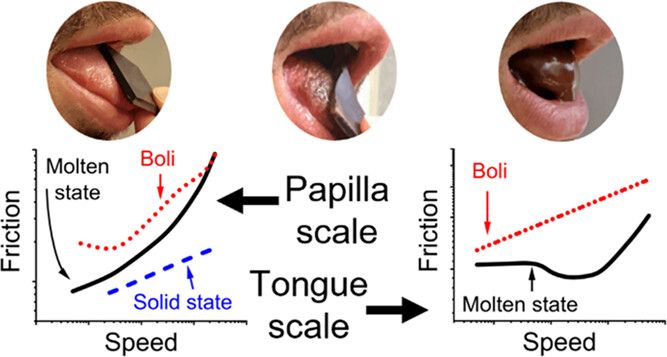Researchers at the University of Leeds, Dr Siavash Soltanahmadi, Prof Michael Bryant and Prof Anwesha Sarkar based at the School of Food Science have looked into why the melt in the mouth taste of chocolate is so irresistable.
The paper Insights into the Multiscale Lubrication Mechanism of Edible Phase Change Materials investigates the lubrication behaviour of phase change materials (chocolate being one of many) from an oral tribology context.
During mastication, a phase change often occurs in a sequence of dynamic interactions between the ingested phase change materials and oral surfaces from a licking stage to a saliva-mixed stage at contact scales spanning micro- (cellular), meso- (papillae), and macroscales. Often the lubrication performance and correlations across length scales and different stages remain poorly understood due to the lack of testing setups mimicking real human tissues.
Unprecedented results from this study supported by transcending lubrication theories reveal how the tribological mechanism in licking shifted from solid fat-dominated lubrication (saliva-poor regime) to aqueous lubrication (saliva-dominant regime), the latter resulted in increasing the coefficient of friction by at least threefold. At the mesoscale, the governing mechanisms were bridging of cocoa butter in between confined cocoa particles and fat coalescence of emulsion droplets for the molten and saliva-mixed states, respectively.
Prof Anwesha Sarkar, from the School of Food Science and Nutrition at Leeds, said it is the “location of the fat in the make-up of the chocolate which matters in each stage of lubrication, and that has been rarely researched”. [BBC News]
Dr Soltanahmadi said: “Our research opens the possibility that manufacturers can intelligently design dark chocolate to reduce the overall fat content.” [BBC News]
This paper garnered significant public interest with articles quickly published in The Guardian and BBC News as well as many many other media outlets.
The broader context of this work paves the way for new types of low fat food that optimise the mouth-feel (enabled via oral tribology insights) which may help users lose weight without comprimising food perception and taste!

